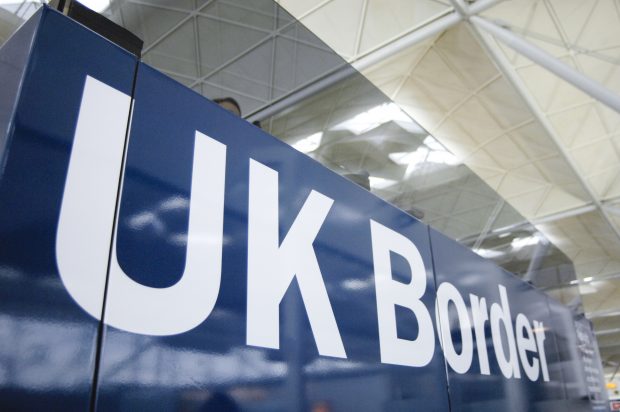Treaty comes into force and will run until June 2026 for pilot scheme to test effectiveness of returns
The Government announced yesterday that an agreement with France has now come into force that allows the UK to return asylum seekers who cross the Channel by small boat. A copy of the official UK/France: Agreement on the Prevention of Dangerous Journeys can be downloaded here.
 Last month, the Government announced that under the 'one in, one out' agreement, France will take back asylum seekers who have crossed into the UK by small boat and who cannot prove a family connection to the UK. In exchange for each person returned, the UK will accept one asylum seeker from France who can demonstrate a genuine family link to the UK.
Last month, the Government announced that under the 'one in, one out' agreement, France will take back asylum seekers who have crossed into the UK by small boat and who cannot prove a family connection to the UK. In exchange for each person returned, the UK will accept one asylum seeker from France who can demonstrate a genuine family link to the UK.
Following subsequent approval by the European Commission and EU Member States, the treaty governing the agreement was ratified and came into force yesterday. An initial pilot phase will begin tomorrow, which the Prime Minister previously said was necessary to assess the effectiveness of the scheme before it is fully implemented.
According to a Home Office press release, the treaty governing the pilot scheme will remain in force until June 2026. The scheme's effectiveness will be reviewed and monitored throughout this period, with a decision on the agreement's long-term future to be made thereafter.
The Home Office explained: "Under the new UK-France returns treaty, any adult migrant who crosses the Channel will now be at risk of return under the pilot scheme if their claim for asylum is considered inadmissible. Immigration Enforcement have set aside space at Immigration Removal Centres, while Border Force have an operational strategy ready to identify and process groups of inadmissible migrants for removal."
The Home Office added that it is "prepared to robustly defend any legal challenges to removal within the initial trial phase, as we look to ramp up both the pace and scale of returns over the course of the pilot scheme."
BBC News reported that it understands that anyone arriving in the UK via small boat will be assessed as being inadmissible, but individuals will be screened to ensure they are suitable for detention and removal.
Earlier media reports suggested that the pilot scheme is only expected to see up to 50 asylum seekers a week being returned to France, with the same number coming in exchange to the UK.
Home Secretary Yvette Cooper told the BBC this morning that she would not put a number on how many asylum seekers would be returned. She said: "The numbers will start lower and then build … [T]hose numbers will vary and will increase and we haven't picked an overall number for the scheme, although we obviously want it to increase as much as possible."
The Conservatives called the agreement a 'gimmick'. Shadow Home Secretary Chris Philp said: "The Government plan being signed today to return just 50 illegal channel immigrants a week, and probably less, will make no difference whatsoever. This amounts to only 6% of illegal arrivals. Allowing 94% to stay in the UK will be no deterrent at all. This is a gimmick which won’t work."
Independent migration researcher and campaigner Zoe Garner told LBC that the scheme will not work, as the 'one in, one out' aspect depends on people continuing to cross the Channel in order to create a safe route to the UK for others. Gardner said the scheme was a sign of an unpopular government 'acting in desperation', attributing the move to recent historically low poll ratings for a Labour government.
The United Nations High Commissioner for Refugees (UNHCR) said last month that it welcomed the announcement of the pilot scheme provided it is appropriately implemented.
In a statement, Philippe Leclerc, UNHCR Director of the Regional Bureau for Europe, said: "Precise operational details of the scheme have yet to be disclosed, and these will be critical in determining how the agreement is implemented in practice. However, if implemented in line with international law, standards and safeguards, the pilot could offer access to protection to asylum-seekers and refugees on both sides of the Channel, with the UK and France demonstrating a shared responsibility and commitment to supporting people fleeing war, violence and persecution."
Steve Peers, Professor of EU and human rights law at Royal Holloway University of London, questioned the legality of the scheme in piece for UK in a Changing Europe last month. He noted: "It's possible that the UK/France arrangements will prove difficult to apply (or scale up) in practice, and that, even if they are applied, they have less of a deterrent effect than their supporters hope for. But in addition to these practical questions, it is also possible – although far from certain – that their application will be blocked, or at least complicated, for legal reasons."
The refugee support charity Care4Calais said it was considering legal action. A spokesperson commented last night: "Care4Calais initiated legal challenges against the last Government’s Rwanda policy and their attempts to introduce 'pushbacks' in the Channel - and we won. We will consider all options open to us to oppose any plans that will put more lives at risk and involve Governments trading humans."